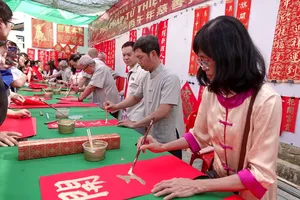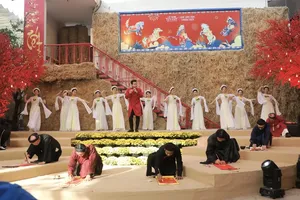
Illicit gains, grave consequences
A TikToker with a million followers can, for all practical purposes, be seen as a “public opinion leader.” Social media, in this context, acts as a “super accelerator.” The problem is that platform algorithms don’t really prize accuracy or depth; they reportedly favor “noise.” They are designed to prioritize content that is shocking and provokes a strong emotional response, especially outrage. This, in turn, creates a phenomenon known as “Emotional Contagion.”
The result? The “best” person isn’t the one doing the best work; it’s the one who’s best at grabbing attention. This dynamic is insidiously redefining human value through the lens of virtual numbers, obscuring contributions of real substance. It’s reported that many young people are even dropping out of school to chase the influencer dream. The reality, however, is far harsher.
The influencer dream is harsh. According to NeoReach, 48 percent of creators earn less than US$15,000 annually; only 13 percent earn over $100,000. Livestreams aren’t guaranteed, and order cancellation rates can hit 50-60 percent, says Nguyen Tung Giang, founder of G Investment Group, a giant in the retail sector. Most KOLs only get 5-10 percent commission. Behind the million views is relentless pressure, anxiety, and platform dependency.
This “illusion of easy success” leads many KOLs to exploit their influence for illicit profit, causing a rise in criminal cases. In October 2025, Ngoc Ngan was arrested for “producing counterfeit food.” The Kera vegetable candy case exposed a “matrix” of fraudulent advertising, leading to the arrests of Hang Du Muc (April 2025), Quang Linh Vlogs, and former Miss Grand International Nguyen Thuc Thuy Tien (May 2025), all for “customer deception.”
The crimes extend to digital schemes. Some KOLs are reportedly involved in digital-era crimes, particularly fraudulent investment schemes like “virtual currency.” Shark Thuy (Egroup) was arrested in March 2024 for “fraud” and “bribery.” Shark Nguyen Hoa Binh (NextTech) was detained in October 2025 for “fraud” and “accounting violations” tied to the AntEx crypto project. TikToker Pho Duc Nam (Mr Pip) was prosecuted for a Ponzi scheme, causing over VND5,200 billion (US$204.4 million) in damages.
Most recently, singer Luong Bang Quang was arrested on October 23, 2025, for “bribery.” These cases expose the stark reality: the line between “virtual power” and a “prison cell” is just one misstep.
Distortion from cyberspace
Statistics from the Ministry of Public Security reveal that in 2024 alone, authorities identified over 12,933 sources initiating “toxic information,” which disseminated over 1 million anti-Party and anti-State documents online. The country is also reportedly monitoring 1,330 “potentially complex” KOLs (44.5 percent of those monitored) and 610 “key” KOLs (20.6 percent) engaged in negative or complex activities.
These actions don’t just harm national interests and sow public confusion; they are in serious violation of Article 117 of the Criminal Code, which covers making, storing, or disseminating information and materials against the Socialist Republic of Vietnam.
Duong Van Thai (also known as Duong Thai), an exile, allegedly used YouTube to spread anti-state propaganda by “splicing and dicing” mainstream news to slander leaders, earning up to $10,000/month before YouTube locked his channel for violating community standards.
Tri Nguyen is also condemnable for using Facebook (2022-2025) to post hostile articles distorting history and slandering Party policies; he was arrested. Similarly, Le Trung Khoa, a self-proclaimed “independent journalist,” was prosecuted in 2024 for posting YouTube videos slandering state leaders and inciting protests. Khoa reportedly received money from foreign reactionary organizations to spread hostile content.
Although authorities try to block toxic info, its rapid, “hard-to-control” spread poisons the minds of young people. Even a professor once considered the pride of Vietnamese mathematics reportedly left a negative impression with disrespectful statements towards President Ho Chi Minh and his fatherland.
Cyber power, however dazzling, is just a “flower in the mirror”, fragile and unreal. Fame borrowed from the community can’t shield anyone from law and ethics. One wrong statement, one fall to temptation, can turn yesterday’s hero into today’s pariah.
The online world demands the fortitude not to lose oneself in the storm of “likes, shares, donates.” Real power isn’t a follower count; it’s public trust, responsibility, and character. When this is fully understood, the illusions will fade, and social media can return to its proper meaning: a true, sober, and humane ecosystem.
Deviant lifestyles, poisoned youth
KOLs aren’t just symbols of fame; they are role models who directly influence the awareness and behavior of young people. However, many KOLs have reportedly fallen into “deviant lifestyles” or promoted substandard behavior.
These actions don’t just distort socio-cultural values and encourage a frivolous, irresponsible way of life; they inflict long-term negative impacts on the younger generation, leading to personality distortions and ethical violations.
DJ Ngan 98, for instance, is famous for her extravagant lifestyle and scandals involving “scantily clad, offensive” attire. In October 2025, at a music show in Hanoi, singer Jack reportedly performed a new song with “arrogant, vulgar” lyrics, using crude wordplay that sparked public outrage.
This is why the youth need to be sober and selective in choosing their idols, and why authorities, like the Ministry of Culture, Sports & Tourism with its network code of conduct, must step up oversight to protect true cultural values and turn the digital space into one that nurtures positive character.
























